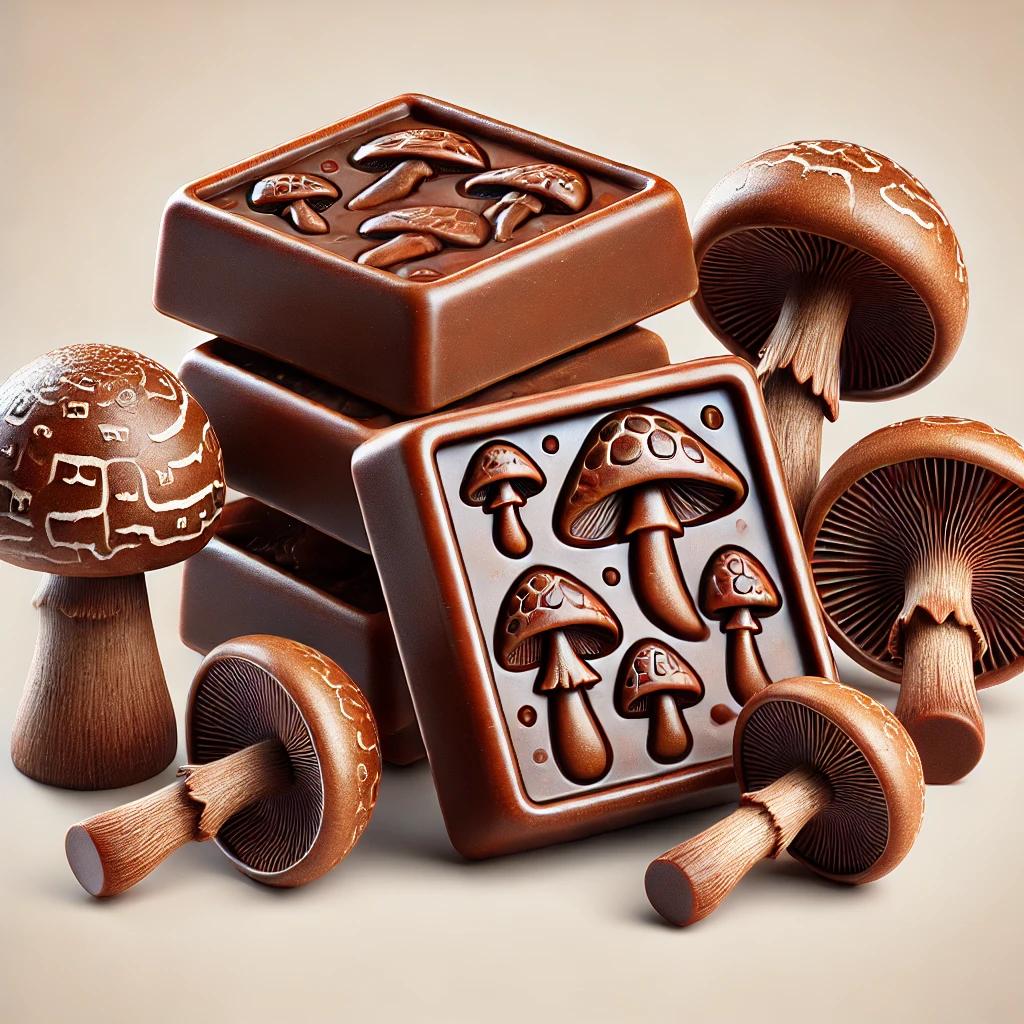Is Mushroom Chocolate Legal?
3rd Oct 2024
In recent years, mushroom chocolate has sparked both curiosity and controversy. This treat combines the rich, velvety taste of chocolate with the potentially mind-altering effects of mushrooms. But the big question remains: Is it legal? In this blog, we'll dive into the complexities of the law, the types of mushrooms used in these chocolates, and what you need to know before considering indulgence. Our aim is to provide a clear, easy-to-understand overview that demystifies mushroom chocolate.

What is Mushroom Chocolate?
Mushroom chocolate combines the indulgence of cocoa with the psychedelic or medicinal properties of mushrooms. The type of mushroom used can vary, with some chocolates incorporating psilocybin, known for its psychedelic effects, while others might use adaptogenic mushrooms for their supposed health benefits. These creations are part of a growing trend that blends gourmet confectionery with the ancient use of mushrooms for various effects on the body and mind.
The allure of mushroom chocolates lies in their ability to provide a more palatable way to consume mushrooms which might otherwise be bitter or unappetizing. Brands like Polkadot offer a range of flavors, such as the S'mores Magic Mushroom Belgian Chocolate, encapsulating the joy of traditional sweets with the added dimension of mushrooms' effects.
Understanding the Legal Landscape
The legality of mushroom chocolate chiefly depends on the type of mushroom used in the chocolate. Chocolates made with psilocybin mushrooms, for instance, are illegal in many jurisdictions due to the psychedelic properties of psilocybin. The legal landscape is complex and varies widely, with some areas decriminalizing or permitting the use of psilocybin under certain conditions, while others maintain strict prohibitions.
Several states in the US have begun to change their stance on psilocybin, recognizing its potential therapeutic benefits. Oregon has led the charge, with initiatives to create a regulated program for its medicinal use. However, notwithstanding these evolving laws, federal law in the United States still classifies psilocybin as a Schedule I controlled substance, rendering it illegal for manufacture, sale, or possession.
Types of Mushrooms in Chocolates
The most common type of mushroom found in these chocolates is Psilocybe cubensis, known for its psilocybin content. However, not all mushroom chocolates are created for psychedelic experiences. Some contain adaptogenic or medicinal mushrooms like Lion's Mane, Chaga, or Reishi. These are touted for health benefits ranging from improved focus to immune support, operating within a different legal framework more akin to dietary supplements than controlled substances.
Legal Implications of Psilocybin Mushrooms
For chocolates containing psilocybin, the legal implications are significant. In jurisdictions where psilocybin remains illegal, possessing, manufacturing, or distributing these chocolates can result in criminal charges. This contrasts with the legal status of medicinal mushrooms, which are widely legal and do not carry the same legal risks.
It's worth noting the emerging legal market in places like Oregon and Colorado, where therapeutic use of psilocybin is being integrated into health practices. Even so, the commercial sale of psilocybin mushrooms, including their incorporation into chocolates, is strictly regulated, requiring adherence to specific state laws and guidelines.
Navigating Local Laws and Regulations
Given the patchwork of regulations surrounding psilocybin and other mushrooms, it's critical for interested consumers to familiarize themselves with the local laws in their area. This research is paramount before purchasing, possessing, or consuming mushroom chocolates, as legal statuses range from fully legal for medicinal use to entirely prohibited.
For those in regions where psilocybin therapy is legalized, like parts of Oregon, engaging with these chocolates requires participating in structured programs or clinics that adhere to state regulations, emphasizing the importance of understanding the legal boundaries and health implications.
Potential Legal Consequences
The risks of engaging with psilocybin mushroom chocolates in areas where they remain illegal are substantial. Potential consequences include fines, criminal charges, and even imprisonment. For products mistaken by children as regular candy, the risks extend beyond legal ramifications, highlighting the need for responsible usage and strict adherence to local laws.
How to Stay Informed and Safe
For enthusiasts or the simply curious, staying informed about the evolving landscape of mushroom chocolate laws is crucial. This can include subscribing to newsletters, following reputable sources online, and participating in community discussions on the topic. Moreover, when considering trying mushroom chocolate, opt for legal options like medicinal mushrooms that don't contain psilocybin, or only do so within the bounds of local laws.
Lastly, always prioritize safety by ensuring products are sourced from reputable providers that offer product transparency, including precise dosing information. Responsible consumption is key, particularly when products may resemble everyday sweets but contain substances that are potent, psychoactive, and in many places, illegal.
Wrapping Up the Mystery
Navigating the legalities of mushroom chocolate can be as complicated as it is fascinating. While there's a buzz around its potential benefits and unique experiences, understanding your local laws and the specific types of mushrooms in your chocolate is crucial. The world of mushroom chocolate is evolving, and staying informed ensures you make choices that are not only legal but also safe for your well-being. Remember, when in doubt, it's always best to err on the side of caution and do your research. Ready to explore more unique treats safely? Visit our homepage for more information.


